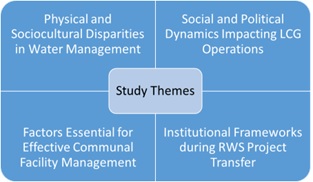Balancing Formal Standards and Community Dynamics: Sustainable Strategies for Rural Hydration Systems in Punjab, Pakistan
Keywords:
Local Council Governments, Sociopolitical Characteristics, Punjab Housing and Urban Development Department.Abstract
This study delves into the intricate balance between formal standards and community dynamics within Rural Hydration Systems (RHS) systems in Punjab, Pakistan. The research illuminates the collaborative frameworks established between Local Council Governments and the Punjab Housing and Urban Development Department (PHED) during RHS project transfers. It highlights how these institutional structures strive to cultivate compliance among diverse stakeholders, emphasizing the role of comprehension, commitment, and reliance in ensuring adherence. Examining four central themes, the study dissects the impact of physical environmental factors and sociopolitical characteristics on adherence to institutional norms. It navigates the dynamic nature of collaborative processes, focusing on trust, communication, shared understanding, and commitment. Furthermore, it outlines the facilitative role of the government and addresses cultural nuances affecting regulations guiding RHS users. Physical and sociocultural disparities in water management are explored, showcasing varying challenges across regions. From arid areas with limited governmental support to locations facing water quality issues, the study underscores the necessity for community-led RHS management. Social and political dynamics significantly influence LCG operations, where effective leadership becomes pivotal in mediating conflicts and ensuring operational efficiency. The study emphasizes challenges faced in water charge collection, unauthorized water use, and conflicting perspectives on water fees due to societal norms. Ultimately, the research delineates essential factors vital for effective communal facility management, emphasizing financial resources, leadership, trust-building, and transparency. It highlights instances of self-driven Local Council Governments ' commitment to communal well-being, exemplifying the impact of community contributions and donations in sustaining RHS systems. This comprehensive analysis provides insights into sustainable strategies for navigating the intricate interplay between formal standards and community dynamics in Punjab's Rural Hydration Systems systems.








